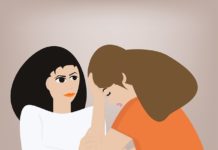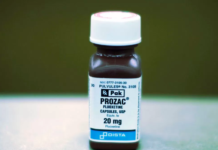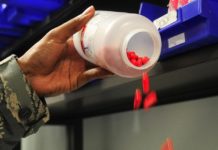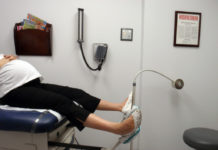What Should We Really Call Psychiatric Drugs?
There is no rational way to argue against putting psychiatric chemicals into the category of neurotoxins. All psychiatric substances alter “the structure or functions of the nervous system,” disrupt “the normal function of nerve cells” and act “specifically on nervous tissue.” It is time to clean up the misleading mess of words in psychiatry.
Psychiatry is a Disaster Area in Healthcare That Needs Attention
In this piece for The BMJ, Dr. Peter Gøtzsche points out several of the major problems with the drug-based paradigm of psychiatric care as well as...
“I Was Afraid to Dismantle the Story About Depression”
In this interview for The Guardian, Johann Hari discusses his latest book, Lost Connections, which critiques bioreductionist models of depression and anxiety and emphasizes environmental influences...
When Your Antidepressant Isn’t as Safe as You Think
In this piece for Psych Central, Dr. Viatcheslav Wlassoff discusses some of the safety issues and adverse effects of antidepressants.
"When it comes to side effects, anticholinergic...
My Life on Antidepressants
In this piece for Vogue, model and writer Sydney Lima shares her experiences with the adverse effects of Sertraline and Bupropion.
"For the next few months,...
Therapeutic Alliance: Implications for Practice and Policy
In this piece for Psychiatric Services, Dr. Sandra Steingard comments on the implications of a recent meta-analysis demonstrating the positive effects of the therapeutic alliance on pharmacologic...
The Demoralized Mind
From openDemocracy: The distress, boredom, and disillusionment so commonly diagnosed as depression may actually result from the demoralization people experience in consumerist cultures. Large-scale cultural change,...
How Pharma Uses the Charge of “Stigma” to Sell Drugs
From The Epoch Times: Many advocacy groups claiming to combat the stigma of mental illness are actually front groups that represent the interests of pharmaceutical...
Antipsychotics, Restraints, and Seclusion Raising Concerns
From ABC Australia: Australia's high rate of antipsychotic prescriptions, as well as the frequent usage of restraints and seclusion, has raised concerns among Australian mental health advocates, researchers,...
When the Cure is the Cause
From Undark Magazine: In late 1970, a pharmacologist discovered that an antibiotic drug designed to cure a disease called SMON (subacute myelo-optic neuropathy) was actually causing...
Psychiatrist Calls for Increased Attention to Therapeutic Alliance
Sandra Steingard, writing in the journal Psychiatric Services, reviews a recent article finding that the quality of the therapeutic relationship impacts the efficacy of medication treatment.
We Still Buy the Lie That Chemical Imbalances Cause Depression
From Quartz: Despite its inaccuracy, the chemical imbalance theory of mental illness continues to persist in public consciousness. The prevalence of this myth may be...
In Opioid Battle, Cherokee Want Their Day in Tribal Court
From The New York Times: The opioid epidemic is wreaking havoc on Cherokee families and putting Cherokee children at risk. Now, the Cherokee Nation has...
It’s Unlikely That ‘Antidepressants’ Have a True Effect on Depression
I submitted a letter to the editor of JAMA pointing out the likely explanation for the lack of effect of sertraline. JAMA rejected my letter, as it has done many times. Explaining why psychiatric drugs don’t work is not a priority for medical journals, it seems.
Preventing Long-term Benzodiazepine Use
Researchers Identify risk factors for long-term benzodiazepine use to prevent harmful effects.
The Inaugural “Shkreli Awards!”
This piece for the Lown Institute lists 10 of the most egregious examples of profit-mongering and lack of empathy in healthcare in 2017. These examples include...
Podcast: The Top 10 Quotes of 2017
In this podcast for HealthNewsReview.org, Michael Joyce shares what he considers the 10 most compelling quotes from last year's podcast episodes. The quotes include a wide variety...
A Response to Columnist Dr. Greg Smith at the Aiken Standard
In this five-part series for the Benzodiazepine Information Coalition, Nicole L. critiques a recent article by Dr. Greg Smith that was highly laudatory of benzodiazepines. Click...
Reducing Antipsychotic Use May Improve Health for People with Mental Health Diagnoses
A new study offers radical solutions for improving the cardiovascular health of people with mental health diagnoses: reducing antipsychotic prescriptions..
When Legal Drugs Harm and Illegal Drugs Help
From Scientific American: In a day and age when people are increasingly becoming addicted to prescription drugs, and increasingly helped by the therapeutic effects of illicit...
Whistleblower Files Lawsuit Against AstraZeneca
From the Chicago Tribune: Former drug sales representative Allison Zayas became a whistleblower against her old company, AstraZeneca, after learning that a combination of Seroquel...
Anticholinergic Medications Linked to Dementia Similar to Early Alzheimer’s
A new study, published in the Journal of Clinical Psychiatry, investigates the effects of anticholinergic medications, such as antidepressants and antipsychotics, on cognition in older adults diagnosed with schizophrenia.
Antidepressants During Pregnancy Increase Risk of Psychiatric Diagnosis in Children
New research, based on data from almost a million children in Denmark, suggests that children of mothers who use antidepressants during pregnancy are more likely to be diagnosed with autism and psychiatric disorders.
More Dangerous Than Opioids – Benzo Overprescription
From The Lown Institute: Opioids aren't the only drug being dangerously overprescribed. The overprescription of benzodiazepines, a psychoactive drug with potentially excruciating side effects and...
Exercise Intervention for Youth at Risk for Psychosis Shows Promise
A new pilot study finds that an exercise intervention can lead to improvement in clinical, social, and cognitive domains for those deemed at risk for psychosis.

































